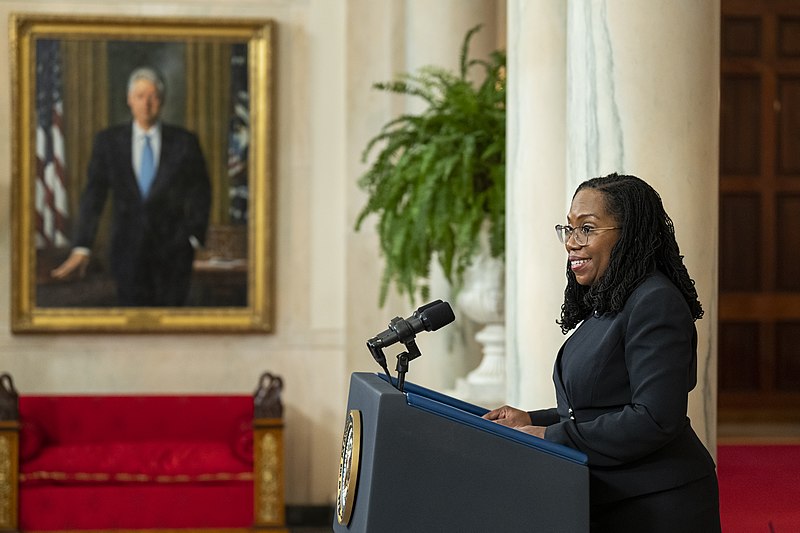This week, federal judge Ketanji Brown Jackson was sworn in as the newest associate justice of the US Supreme Court. Jackson is succeeding retiring liberal Justice Stephen Breyer, who also officially retired the same day.
Jackson was officially sworn in Thursday as the newest Supreme Court Justice while also making history as the first Black woman to serve on the highest court of the country. Jackson succeeded retiring liberal Justice Stephen Breyer, who also officially retired Thursday.
Jackson’s swearing-in comes months after she was confirmed by the Senate at a 53-47 vote back in April. Jackson was previously appointed by President Joe Biden and confirmed by the same Senate last year to the DC Court of Appeals after serving eight years as a federal judge.
“I am glad for America,” said Breyer in a statement. “Ketanji will interpret the law wisely and fairly, helping that law to work better for the American people, whom it serves.”
Jackson will participate in arguments on cases when the high court starts a new term in October, joining a liberal minority against the court’s currently Conservative majority of 6-3.
Breyer’s retirement and Jackson’s swearing-in also come at a time when the high court, especially its Conservative majority, has been under heavy scrutiny following its recent rulings overturning Roe v. Wade, expanding the rights of firearm owners, limiting the federal government’s authority to regulate carbon emissions, and expanding religious liberties.
Another case that the court is set to take on is whether state legislatures have the authority to ignore courts on election rules if found to be unconstitutional.
The striking down of the landmark abortion ruling suggests that Chief Justice John Roberts has lost control of the Supreme Court and could also see his legacy tarnished because of it, according to two legal scholars.
University of Texas law professor Stephen Vladeck told Politico’s Josh Gerstein that the overturning of Roe v. Wade was the “capstone piece,” showing very little proof that the court is still Roberts’ court, noting that the Chief Justice is essentially powerless due to the internal conflicts between both sides.
American University historian Stephen Wermiel said the court’s overturning of Roe v. Wade is “the most important decision of his tenure as chief justice and he’s not part of it.”



 Trump Backs Nexstar–Tegna Merger Amid Shifting U.S. Media Landscape
Trump Backs Nexstar–Tegna Merger Amid Shifting U.S. Media Landscape  Trump Endorses Japan’s Sanae Takaichi Ahead of Crucial Election Amid Market and China Tensions
Trump Endorses Japan’s Sanae Takaichi Ahead of Crucial Election Amid Market and China Tensions  Trump Signs “America First Arms Transfer Strategy” to Prioritize U.S. Weapons Sales
Trump Signs “America First Arms Transfer Strategy” to Prioritize U.S. Weapons Sales  Trump’s Inflation Claims Clash With Voters’ Cost-of-Living Reality
Trump’s Inflation Claims Clash With Voters’ Cost-of-Living Reality  Jack Lang Resigns as Head of Arab World Institute Amid Epstein Controversy
Jack Lang Resigns as Head of Arab World Institute Amid Epstein Controversy  Ohio Man Indicted for Alleged Threat Against Vice President JD Vance, Faces Additional Federal Charges
Ohio Man Indicted for Alleged Threat Against Vice President JD Vance, Faces Additional Federal Charges  TrumpRx.gov Highlights GLP-1 Drug Discounts but Offers Limited Savings for Most Americans
TrumpRx.gov Highlights GLP-1 Drug Discounts but Offers Limited Savings for Most Americans  U.S. Announces Additional $6 Million in Humanitarian Aid to Cuba Amid Oil Sanctions and Fuel Shortages
U.S. Announces Additional $6 Million in Humanitarian Aid to Cuba Amid Oil Sanctions and Fuel Shortages  New York Legalizes Medical Aid in Dying for Terminally Ill Patients
New York Legalizes Medical Aid in Dying for Terminally Ill Patients  Trump Allows Commercial Fishing in Protected New England Waters
Trump Allows Commercial Fishing in Protected New England Waters  Norway Opens Corruption Probe Into Former PM and Nobel Committee Chair Thorbjoern Jagland Over Epstein Links
Norway Opens Corruption Probe Into Former PM and Nobel Committee Chair Thorbjoern Jagland Over Epstein Links  U.S. to Begin Paying UN Dues as Financial Crisis Spurs Push for Reforms
U.S. to Begin Paying UN Dues as Financial Crisis Spurs Push for Reforms  Trump Says “Very Good Talks” Underway on Russia-Ukraine War as Peace Efforts Continue
Trump Says “Very Good Talks” Underway on Russia-Ukraine War as Peace Efforts Continue  Pentagon Ends Military Education Programs With Harvard University
Pentagon Ends Military Education Programs With Harvard University  Netanyahu to Meet Trump in Washington as Iran Nuclear Talks Intensify
Netanyahu to Meet Trump in Washington as Iran Nuclear Talks Intensify  Nighttime Shelling Causes Serious Damage in Russia’s Belgorod Region Near Ukraine Border
Nighttime Shelling Causes Serious Damage in Russia’s Belgorod Region Near Ukraine Border  India–U.S. Interim Trade Pact Cuts Auto Tariffs but Leaves Tesla Out
India–U.S. Interim Trade Pact Cuts Auto Tariffs but Leaves Tesla Out 































